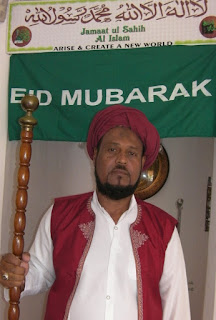Eid & Divine Forgiveness
When
Ramadan comes to an end, we get the night of Eid - Lailatul
Jaa’izah, that is to say, the night
of retribution. On the morning of Eid, Allah (swt) sends the angels
to earth, where they take up positions shouting in a voice that all
except humans and Jinn can hear: “O
Ummah of Muhammad (pbuh), come forth from your houses towards a Lord
that is noble and gracious, who grants much and pardons the major
sins.”
When
the people proceed for the Eid prayer, Allah asks the angels :
“What indeed is the reward of that
employee who had rendered his services?”
The angels reply: “O Lord and Master,
it is only right that he should receive his reward in full for his
services.”
 Allah then says: “I
call you to witness, O My angels, that for their having fasted during
the month of Ramadan, and for their having stood in prayer by night,
I have granted to them as reward My pleasure and have granted them
forgiveness.”
Allah then says: “I
call you to witness, O My angels, that for their having fasted during
the month of Ramadan, and for their having stood in prayer by night,
I have granted to them as reward My pleasure and have granted them
forgiveness.”
Addressing
His servants, Allah says: “O My
servants ask now of Me, for I swear by My honour and My greatness,
that whatsoever you shall beg of me this day in this assembly of
yours for the needs of the Hereafter and this world, I shall grant
you. By My honour I swear, as long as you shall obey my commands, I
shall cover your faults. By My honour and by My greatness do I swear
that I shall never disgrace you among the evil-doing ones and
disbelievers. Depart now from here, you are forgiven. You have
pleased Me, and I am pleased with you.”
The
angels upon seeing this great reward bestowed by Allah upon the Ummah
of Hazrat Muhammad (pbuh) on the day of Eid
(Eid-ul Fitr)
become greatly pleased and happy.
*** O
Allah count us also among those fortunate people,
Ameen. ***


